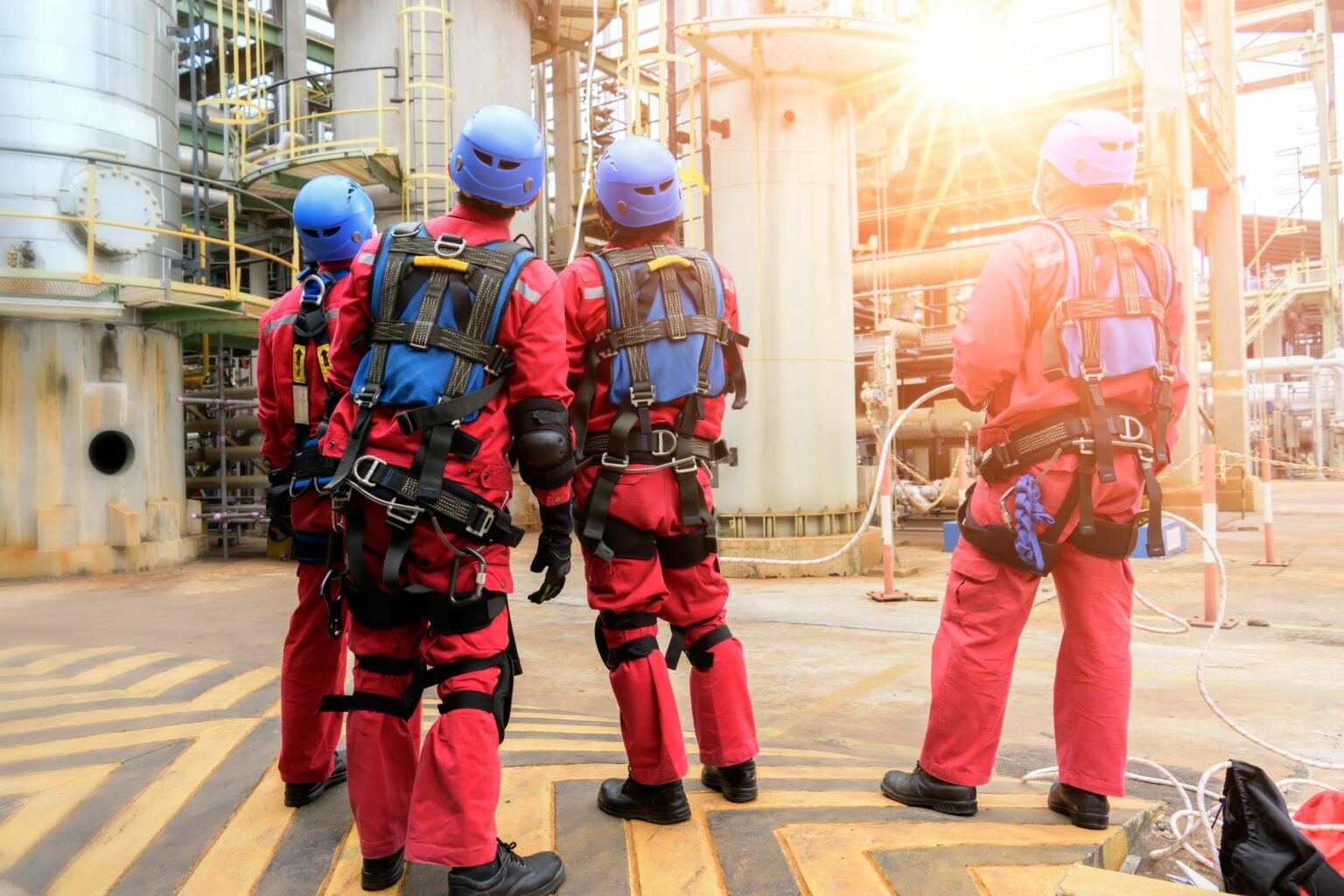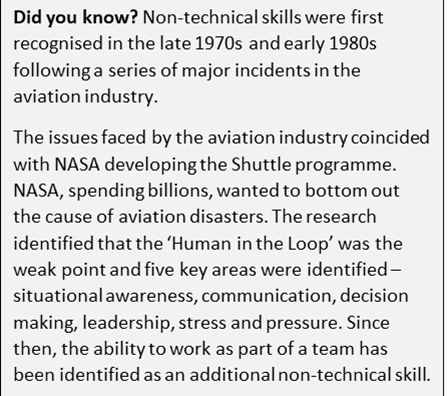Developing non-technical skills in emergency response with Hazmat Academy
- April 19, 2022
- 8:35 am


Iain Hoey
Share this content
Antony Bholah, FRS station manager, Dorset & Wiltshire and Ed Sullivan NCEC Hazmat Academy manager put their highly sought-after expertise together as they go in detail analysing the importance of non-technical skills for emergency responders
Training for emergency responders (ERs), specifically technical training, is centred around ensuring responders in the public and private sectors are safe, effective, competent, and confident in their response to incidents.
But what about the skills that aren’t ‘technical’? After reviewing training requirements of more than 800 learners, experts at the Hazmat Academy, NCEC’s training platform, have found that there is still a lack of focus on developing and practising non-technical skills, which can fundamentally affect the management and outcome of an incident. Dorset and Wiltshire Fire and Rescue Service has already identified the benefits of such training and included it in its training programme.
Non-technical skills can be defined as ‘the cognitive and social skills that complement a workers’ technical skills and, as such, contribute to safe and efficient task performance’ (Flin, O’Connor and Crichton 2008) and can be developed to complement an ER’s everyday skill set. These skills are include situational awareness, communication, decision making, leadership, stress and pressure, and teamwork.

Situational awareness
The three stages of situational awareness are: the ability to know what is going on around you by gathering information; making sense of this information and anticipating what could happen next.
ERs need to be able to demonstrate strong situational awareness in all three stages to fully understand the implications of acting on information received. They also need to consider that everyone perceives information differently based on the context and their own subconscious bias and experiences. The danger with situational awareness is that it can be affected by several components, which include lack of awareness in training, human limitations, stress, fatigue, and bias. ERs need to be trained to recognise these components to have a better chance of making the right decision.
It can be difficult for ERs to develop situational awareness while dealing with low-frequency incidents, such as those involving hazardous materials, which are known to be high risk. There is little that can be done about the level of risk. However, by increasing the frequency of high-quality training, ERs can develop mental models to refer to during high-pressure response situations.
Communication
Communication is vitally important when responding to incidents. It must be of a suitable style and frequency for each situation. When reviewing lessons learned or case studies of incidents, communication is highlighted, but is usually focused on the technical aspects. Factors that are technical by their nature could include battery failings, radio dead spots or an individual failing to select the appropriate radio channel – but should there be more focus on communicating effectively during an incident? For maximum effectiveness, non-technical skills training should develop an ER’s ability to communicate effectively in a style suitable for the stakeholder and at an appropriate frequency.
The following should be considered: Do you communicate effectively in 360 degrees? Do you consider the required frequency and most effective style of communications for each stakeholder? Do you communicate well under pressure?
If the answer to any of the above is no or if you’re unsure, then you need to review your communication skill set.
Decision making
This is defined as the process of reaching a judgement or making the choice between options, perhaps better understood as a course of action to deal with the incident. In a pressured situation, the cognitive capacity of even the most resilient responders can become overloaded and compromised. Cognitive capacity can be affected by: too much information, habit, biases, health, groupthink, distractions, levels of experience, emotions, and pressure.
Applying learnt controls and tools is necessary to enable the decision maker to reach a successful outcome when dealing with incidents.
Leadership
When leading a response team, ERs need to reflect on how their leadership style in an emergency is interdependent on their leadership style in a non-emergency situation. At any incident, the lead responder must enable and empower ERs to approach them with new information. The leadership style before the emergency sets the tone of how team members react during the emergency.
Leaders must have the ability to be flexible in their leadership style in response to dynamic situations, taking on a more directive style when managing incidents and being more consultative in times of less risk.
Stress and pressure
There are many different factors to be considered regarding an individual’s ability to work in a stressful environment. Through self-awareness, training, utilising stress reduction techniques, being physically fit and being able to ask for support, responders can reduce the risk of negative impact from stress. When dealing with dynamic incidents, responders can manage the associated stress in the preparation phase by carrying out relevant training, which can assist them in becoming more familiar with that incident type.
Teamwork
When developing teamwork skills, responders must be mindful that they won’t always be part of the same team. They must reflect on how they are perceived by and respond to other team members, how they behave within a team and the impact of their behaviour. Within every highly effective team, there is a culture in which feedback is routinely given and accepted.
Developing and practicing non-technical skills
When reflecting on case studies of incidents where responders have been killed or seriously injured, there is usually an element of human error involved. To reduce the chance of this, ERs need to develop their non-technical skills.
It is necessary to continue to train and test technical skills to enable responders to be safe, effective, competent, and confident. Non-technical and technical skills training can occur simultaneously to assist with the time constraints placed upon response teams and organisations.
It is recommended that if training leads want to reduce the risk of human error and improve the safety of responders, they should look to integrate non-technical skills into training programmes at the earliest opportunity. Responders should continue to develop and practise these skills regularly.
NCEC’s training platform, Hazmat Academy, is a hazardous materials (hazmat) training model. It has revolutionised hazmat training by providing a contemporary solution that meets the needs of individuals and takes account of the modern-day challenges that emergency services and commercial organisations are facing.
The Hazmat Academy’s off-the-shelf courses cover non-technical skills, emergency response, chemical response training and detection, identification, and monitoring. They also offer distance learning modules on different topics such as waste fires, hydrogen fluoride and refrigerant gases and can cater to bespoke requirements.
All courses are accredited by the International Organisation for Industrial Emergency Services Management (JOIFF) and the hazmat courses are delivered in partnership with the Fire Service College.
The following schedule has been announced for this year’s emergency response courses:
- Hazardous materials adviser initial: 27 June, 5 September, and 21 November
- Hazardous materials first responder: 23 May
- Hazardous materials instructor: 12 September
- Hazardous materials adviser revalidation: 7 November
The academy’s distance learning courses are available to book all year around. You can find out more about the hazmat and chemical training courses through their website www.thehazmatacademy.co.uk. If you would like to speak with one of the hazmat academy experts for a more bespoke requirement, please contact them at [email protected].



